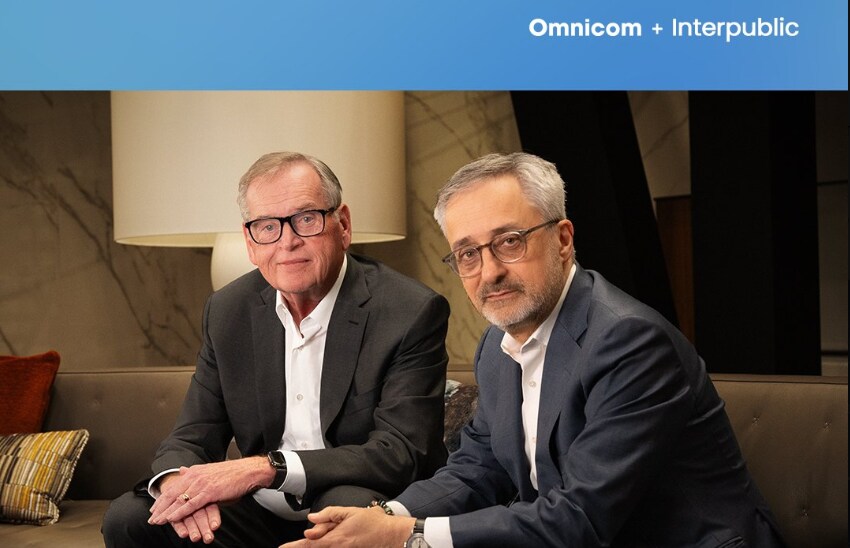Omnicom closes its takeover of IPG, reshaping global advertising and raising questions in India
The $13.5 billion all-stock acquisition ends IPG’s run as an independent network and places Omnicom at the top of a consolidating industry, with major implications for agencies and talent across global markets, including India.
ADVERTISEMENT
Nearly a year after unveiling a plan that stunned the global ad world, Omnicom has completed its acquisition of the Interpublic Group, sealing one of the most consequential deals in the history of modern advertising. With the closing, IPG disappears as a standalone holding company, and Omnicom emerges as the industry’s largest global player, eclipsing Publicis and overtaking rivals during a period of sweeping consolidation.
The combined company, with revenue exceeding $25 billion, will trade under Omnicom’s existing OMC ticker on the New York Stock Exchange.
Calling the moment “defining,” Omnicom’s longtime chairman and chief executive John Wren said the company is positioned to set “a new standard for modern marketing and sales leadership,” pointing to integration plans that will marry Omnicom’s data stack with IPG’s Acxiom business. “We’re excited about this next chapter,” he said in a statement.
For now, the story shifts from regulatory approvals to the slower, more complicated work of integrating more than 100,000 employees across hundreds of agencies — and to answering the question that has loomed over the industry for months: which iconic agency brands will survive this merger, and how deep the job cuts will go.
A Deal Structured as an Acquisition — With Leadership to Match
Though often described as a merger, the transaction is effectively an all-stock acquisition. IPG shareholders will receive 0.334 shares of Omnicom for each share they held. Wren will continue in his top role, while IPG chief executive Philippe Krakowsky joins as co-president and chief operating officer, working alongside Omnicom veteran Daryl Simm. IPG executives Patrick Moore and E. Lee Wyatt Jr have also taken seats on the expanded Omnicom board.
The full leadership slate is expected next week, along with initial decisions on agency alignments and operating structures.
Advertisers, holding companies and employees have braced for a year of reorganization. The companies have signaled annual cost savings of $750 million — a number that has fueled speculation of agency closures and overlapping capabilities being merged or retired. That anxiety intensified this month after IPG reported 800 job losses in the third quarter alone and more than 3,000 for the year to date.
The takeover marks the first time a megamerger in global advertising has actually closed. The last comparable attempt — between Omnicom and Publicis in 2014 — collapsed under the weight of governance and tax complications.
Implications in India: A Market Undergoing Its Own Upheaval
While the deal reshapes the global hierarchy, it lands in India during a period of acute pressure on agency profitability. India’s advertising market — one of the fastest-growing globally — has been shifting toward performance-led marketing, measurable outcomes and hybrid creative–technology models.
Large networks in India have been consolidating agency portfolios, trimming underperforming units, and doubling down on integrated creative, digital, commerce and media offerings. There's rising pressure on global networks’ India operations to deliver margins amid cost-sensitive clients, rapid growth in influencer marketing, and the dominance of digital platforms.
Omnicom and IPG previously operated dozens of brands in India spanning creative, media, design, PR, health and experiential marketing. The combined entity now faces the challenge of avoiding overlap in a market where clients increasingly demand streamlined structures and fewer agency partners.
India’s agencies are also contending with major shifts in categories like FMCG, auto, and tech, where marketers are demanding faster creative cycles, real-time analytics, AI-enabled workflows, and omnichannel measurement tools. These priorities align with Omnicom’s promise to integrate Omni and Acxiom — but they could also accelerate restructuring on the ground.
Unanswered Questions: Jobs, Agencies and Market Reaction
With both companies having trimmed staff in anticipation of the merger — IPG announcing 3,200 job cuts this year and Omnicom signaling reductions of 10% in staff costs and 3% in headcount — more layoffs appear likely as redundancies are identified.
Markets have been cautious. Shares of Omnicom and IPG fell 32% and 13% respectively over the past year, and with the closing announced after the bell, a fuller picture of investor sentiment will emerge in the days ahead.
The fate of individual agency brands, including storied networks like DDB, remains unclear. For now, the IPG name disappears, but agencies under both groups will continue to operate until the new leadership announces a final structure beginning December 1.
The consolidation highlights a broader trend shaping the advertising world: legacy giants are racing to reinvent themselves around data, AI, consumer identity, measurement and retail media — while keeping pace with digital platforms that increasingly dominate ad spending.
As the industry enters its next chapter, Omnicom, now the largest player of all, will have to prove that scale can translate into agility — in New York, London and increasingly, in growth markets like India.


